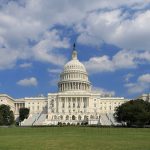New Marquette Law School Poll finds majority of Republicans across the nation favor a Trump run for president in 2024, while majority of voters overall are opposed
Please note: Complete Poll results and methodology information can be found online at law.marquette.edu/poll
MILWAUKEE — A Marquette Law School Poll survey of adults nationwide finds a majority of Republicans wanting former President Donald Trump to run for president in 2024, although a majority of all adults in the survey say they do not want him to run. Among all respondents, 28% would like to see Trump make another run for the presidency, while 71% do not want him to run again.
All results in the tables below are stated as percentages; the precise wording of the questions can be found in the online link noted above. The results are from a nationwide survey of 1,004 adults in the period Nov. 1-10, 2021. The margin of error in the current poll is +/-3.9 percentage points.
Table 1: Would like Trump to run in 2024, by party identification, Nov. 2021
| Party ID | Yes | No |
| Republican | 60 | 40 |
| Independent | 26 | 73 |
| Democrat | 6 | 94 |
The extent of support for a return by Trump to campaigning is also seen in his favorability ratings. Among all adults, 32% have a favorable opinion of him, while 65% have an unfavorable opinion and 3% say they don’t have an opinion of him.
As with a possible 2024 run, Trump is viewed favorably by a very large percentage of Republicans, but he faces net unfavorable ratings from independents and especially negative views from Democrats, as shown in Table 2.
Table 2: Trump favorability, by party identification, Nov. 2021
| Party ID | Favorable opinion | Unfavorable opinion | Haven’t heard enough |
| Republican | 73 | 26 | 1 |
| Independent | 28 | 68 | 3 |
| Democrat | 4 | 92 | 4 |
In a rematch with President Joe Biden in a possible 2024 election, Trump receives support of 34% of those polled, against Biden’s 42%, while 18% say they wouldn’t vote for either and 6% say they would not vote.
Once more, there are variations in the support for Trump, by party identification, as seen in Table 3. The relatively high percentage of each partisan group saying they would vote for someone else or wouldn’t vote suggests the difficulty either candidate faces looking to a 2024 race as of now.
Table 3: Vote for Trump or Biden in 2024, by party identification, Nov. 2021
| Party ID | Donald Trump | Joe Biden | Someone else | Wouldn’t vote |
| Republican | 73 | 10 | 14 | 2 |
| Independent | 31 | 34 | 25 | 10 |
| Democrat | 7 | 78 | 11 | 4 |
Biden’s national “favorability” rating stands at 45% favorable and 49% unfavorable, with 6% saying they can’t give a rating. His favorability by party is shown in Table 4. Biden struggles with independents, a majority of whom are unfavorable to him. He makes few inroads with Republicans, where his rating is a mirror image of his Democratic favorability.
Table 4: Biden favorability, by party identification, Nov. 2021
| Party ID | Favorable opinion | Unfavorable opinion | Haven’t heard enough |
| Republican | 13 | 83 | 4 |
| Independent | 38 | 55 | 8 |
| Democrat | 83 | 13 | 5 |
Vice President Kamala Harris is seen favorably by 38% of respondents and unfavorably by 46%. Sixteen percent say they haven’t heard enough to have an opinion. Favorability to Harris by party identification is shown in Table 5.
Table 5: Harris favorability, by party identification, Nov. 2021
| Party ID | Favorable opinion | Unfavorable opinion | Haven’t heard enough |
| Republican | 10 | 83 | 8 |
| Independent | 29 | 47 | 24 |
| Democrat | 76 | 13 | 12 |
Opinions of Harris and Biden are closely linked. Among all respondents, 36% have favorable views of both and 41% have unfavorable views of both. Four percent have a favorable view of Biden but an unfavorable view of Harris, and 2% have an unfavorable view of Biden but a favorable one of Harris. The remaining 17% lack an opinion of Harris or Biden or both.
Among Democrats, 73% have favorable views of both Biden and Harris, 7% are unfavorable to both, with 4% favorable to Biden but unfavorable to Harris and 3% unfavorable to Biden but favorable to Harris. Thirteen percent lack an opinion of one or both.
Among independents, 42% are unfavorable to both Biden and Harris, 26% are favorable to both, 4% favorable to Biden but unfavorable to Harris, and 2% unfavorable to Biden but favorable to Harris. More than a quarter, 26%, lack an opinion of Harris or Biden or both.
Former Vice President Mike Pence is viewed favorably by 29%, unfavorably by 51%, and 20% say they haven’t heard enough to have an opinion.
The standing of Pence, a potential 2024 presidential candidate, with partisan groups is shown in Table 6. His favorability ratings among Republicans are not as strong as are Trump’s among Republicans, although he has a slightly lower unfavorable rating than Trump. After Pence’s four years as vice president, 14% of Republicans say they don’t know enough to have an opinion of him. His ratings among independents are 50% unfavorable to 22% favorable, with 28% lacking an opinion.
Table 6: Pence favorability, by party identification, Nov. 2021
| Party ID | Favorable opinion | Unfavorable opinion | Haven’t heard enough |
| Republican | 64 | 22 | 14 |
| Independent | 22 | 50 | 28 |
| Democrat | 10 | 77 | 13 |
Confidence in 2020 election result
Beliefs about the accuracy of the 2020 election outcome continue to divide the population. Sixty-five percent say they are very or somewhat confident that the presidential election was accurately conducted and counted, while 35% say they are not too or not at all confident about the election results.
These views clearly divide partisans, as shown in Table 7. More than two-thirds of Republicans lack confidence in the election results. A little over 60% of independents are confident in the election results, as are nearly all Democrats.
Table 7: Confidence in 2020 election count, by party identification, Nov. 2021
| Party ID | Confident | Not confident |
| Republican | 31 | 68 |
| Independent | 62 | 38 |
| Democrat | 95 | 5 |
Pence has drawn criticism in some Republican circles for his role in presiding over the electoral vote counting on Jan. 6. However, he has a higher favorability rating among those Republicans who are not confident in the election count, 72%, than he receives from those who say they are confident in the outcome, 45%. Among those Republicans with a favorable view of Trump, Pence’s favorability rating is 71%, with 20% unfavorable and 9% who offer no opinion.
Biden approval rating
Biden’s job approval rating has declined since July, as shown in Table 8. In November, 49% approved and 51% disapproved, down from 58% approval and 42% disapproval in July. His November approval is barely changed since September.
Table 8: Approve or disapprove of Biden’s handling of his job, July-Nov. 2021
| Poll dates | Approve | Disapprove |
| 7/16-26/21 | 58 | 42 |
| 9/7-16/21 | 48 | 52 |
| 11/1-10/21 | 49 | 51 |
Biden’s approval has fallen 14 points among independents and 13 points among Democrats since July. Republican approval fell in September, but rebounded in November, as in Table 9.
Table 9: Approve or disapprove of Biden’s handling of his job, by party identification, July-Nov. 2021
| Party ID | Poll dates | Approve | Disapprove |
| Republican | 7/16-26/21 | 16 | 84 |
| Republican | 9/7-16/21 | 9 | 90 |
| Republican | 11/1-10/21 | 17 | 82 |
| Independent | 7/16-26/21 | 57 | 43 |
| Independent | 9/7-16/21 | 43 | 57 |
| Independent | 11/1-10/21 | 43 | 57 |
| Democrat | 7/16-26/21 | 96 | 3 |
| Democrat | 9/7-16/21 | 89 | 11 |
| Democrat | 11/1-10/21 | 83 | 16 |
Approval of how Congress is handling its job is at 27% in November, with disapproval at 72%. Table 10 shows approval has declined 6 percentage points since July. This poll was 78% completed when the House of Representatives passed the bipartisan infrastructure bill on Nov. 5, so any impact of that is not reflected in the results for most respondents.
Table 10: Approve or disapprove of how Congress is handling its job, July-Nov. 2021
| Poll dates | Approve | Disapprove |
| 7/16-26/21 | 33 | 66 |
| 9/7-16/21 | 30 | 70 |
| 11/1-10/21 | 27 | 72 |
Approval of Congress has declined among Republicans and independents since July, while it has remained stable among Democrats, as shown in Table 11.
Table 11: Approve or disapprove of how Congress is handling its job, by party identification, July-Nov. 2021
| Party ID | Poll dates | Approve | Disapprove |
| Republican | 7/16-26/21 | 22 | 76 |
| Republican | 9/7-16/21 | 15 | 84 |
| Republican | 11/1-10/21 | 15 | 85 |
| Independent | 7/16-26/21 | 31 | 68 |
| Independent | 9/7-16/21 | 26 | 74 |
| Independent | 11/1-10/21 | 23 | 77 |
| Democrat | 7/16-26/21 | 43 | 55 |
| Democrat | 9/7-16/21 | 47 | 52 |
| Democrat | 11/1-10/21 | 45 | 54 |
Opinions on coronavirus issues remain divided
A majority of respondents, 56%, support requiring vaccinations or frequent COVID testing at companies with more than 100 employees, with 44% opposed. Partisan differences in support for vaccination requirements are shown in Table 12.
Table 12: Favor or oppose mandatory vaccine or testing at large companies, by party, Nov. 2021
| Party ID | Favor | Oppose |
| Republican | 28 | 72 |
| Independent | 55 | 45 |
| Democrat | 80 | 20 |
The percentage saying coronavirus is a serious problem in the respondent’s state has declined since September as the rate of infection has fallen nationally, as shown in Table 13 for September and November.
Table 13: Is coronavirus a serious problem in the respondent’s state, Sept.-Nov. 2021
| Poll dates | Serious problem | Not serious problem |
| 9/7-16/21 | 68 | 32 |
| 11/1-10/21 | 50 | 50 |
The perception of coronavirus as a serious problem has fallen most sharply in the South followed by the West. The Midwest and East show less of a decline in the perceived problem. (The baseline perception, in September, was higher in the South and West than in the East and Midwest.) The regional differences appear in Table 14.
Table 14: Is coronavirus a serious problem in the respondent’s state by region, Sept.-Nov. 2021
| Region | Poll dates | Serious problem | Not serious problem |
| East | 9/7-16/21 | 59 | 41 |
| East | 11/1-10/21 | 46 | 54 |
| Midwest | 9/7-16/21 | 59 | 41 |
| Midwest | 11/1-10/21 | 50 | 50 |
| South | 9/7-16/21 | 78 | 22 |
| South | 11/1-10/21 | 53 | 47 |
| West | 9/7-16/21 | 67 | 33 |
| West | 11/1-10/21 | 48 | 52 |
The percentage thinking coronavirus is a serious problem in their state has declined by about 20 percentage points across each partisan group since September, although the partisan differences in level of concern remain substantial, as shown in Table 15.
Table 15: Whether coronavirus is a serious problem in the respondent’s state, by party identification, Sept.-Nov. 2021
| Party ID | Poll dates | Serious problem | Not serious problem |
| Republican | 9/7-16/21 | 49 | 51 |
| Republican | 11/1-10/21 | 30 | 70 |
| Independent | 9/7-16/21 | 64 | 36 |
| Independent | 11/1-10/21 | 48 | 52 |
| Democrat | 9/7-16/21 | 90 | 10 |
| Democrat | 11/1-10/21 | 70 | 30 |
In this survey, 78% say they have received at least one vaccine dose and 22% say they have not been vaccinated. As of the end of the survey field period, the Centers for Disease Control and Prevention (CDC) reported that 81% of those 18 years old or older had been vaccinated.
There are partisan differences in vaccination rates, shown in Table 16. Table 17 shows that these vaccination rates are also related to how serious a problem respondents think coronavirus is.
Among Republicans who think coronavirus is not a serious problem in their state, 61% have been vaccinated, while among Republicans who think it a serious problem, 90 percent have received at least one dose of the vaccine. A sense of seriousness also accompanies higher vaccination rates for independents and Democrats.
Table 16: Vaccination status, by party identification, Nov. 2021
| Party ID | Vaccinated | Not vaccinated |
| Republican | 70 | 30 |
| Independent | 74 | 25 |
| Democrat | 89 | 11 |
Table 17: Vaccination status, by whether coronavirus is a serious problem in the respondent’s state and by party identification, Nov. 2021
| Party ID | Coronavirus a serious problem | Vaccinated | Not vaccinated |
| Republican | Serious problem | 90 | 10 |
| Republican | Not serious problem | 61 | 39 |
| Independent | Serious problem | 84 | 16 |
| Independent | Not serious problem | 65 | 33 |
| Democrat | Serious problem | 93 | 7 |
| Democrat | Not serious problem | 78 | 21 |
Reluctance to be vaccinated in the future remains high among the unvaccinated. Among those not yet vaccinated, 47% say they will definitely not get the shot, 34% say they probably won’t, and 18% say they definitely or probably will get vaccinated.
About the Marquette Law School Poll
The survey was conducted Nov. 1-10, 2021, interviewing 1004 adults nationwide, with a margin of error of +/-3.9 percentage points. Interviews were conducted using the SSRS Opinion Panel, a national probability sample with interviews conducted online. The detailed methodology statement, survey instrument, topline results, and crosstabs for this release are available at https://law.marquette.edu/poll/category/results-and-data/.
NOTE: This press release was submitted to Urban Milwaukee and was not written by an Urban Milwaukee writer. While it is believed to be reliable, Urban Milwaukee does not guarantee its accuracy or completeness.
Mentioned in This Press Release
Recent Press Releases by Marquette University
New Marquette Law School Poll finds large majority of Wisconsin voters not yet tuned in to who is running in major 2026 elections
Oct 29th, 2025 by Marquette UniversityNo candidate has established strong position in public favorability in governor, state Supreme Court races; large majorities of voters undecided
New Marquette Law School National Survey Finds Large Majority Think Political Violence is a Big Problem, But With Sharp Partisan Differences
Oct 1st, 2025 by Marquette UniversityAmericans are overall pessimistic on reducing intense political conflict; half of those polled say heated language by leaders makes violence more likely






















